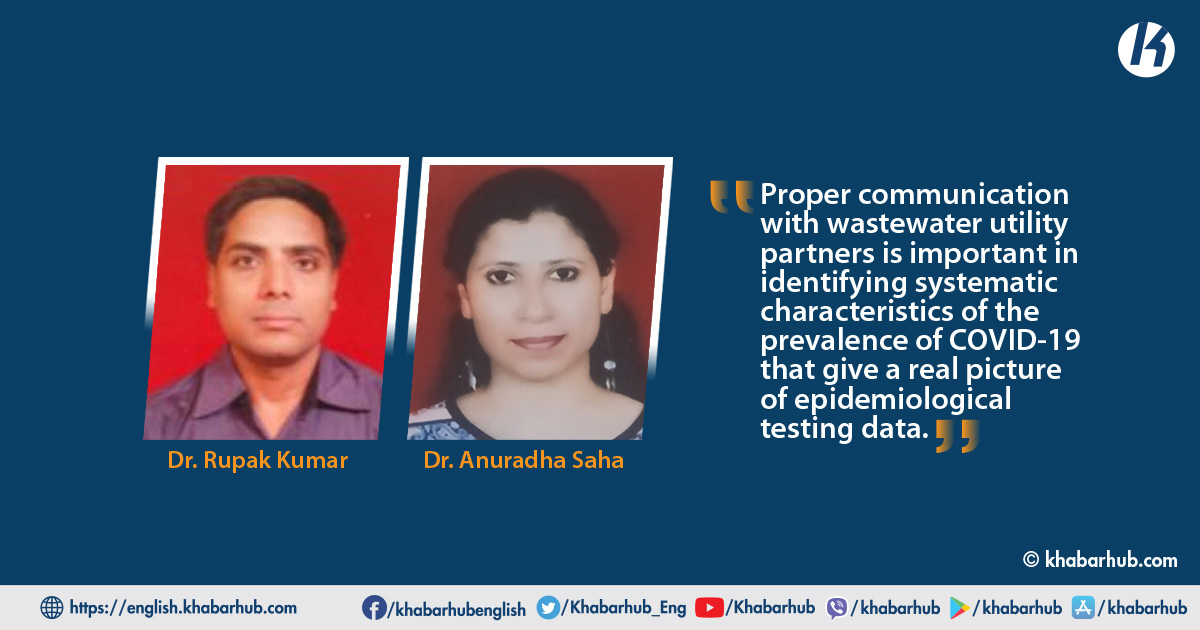The importance of wastewater or sewage water has not been recognized until recently. It is increasingly being explored as a potential ‘new’ source of clean water for potable and non-potable uses.
The process involves the use of modern technology like filtration, reverse osmosis, ozonolysis, and UV treatment, resulting in social, environmental and economic benefits.
The nature of wastewater solely depends upon the source of its origin and discharges or chemicals that merge into it during its movement from one place to another.
During its movement, it not only is reused to feed crops, animals, and household activities but also acts like an early warning system that could alter the penetration of specific microbial load or disease when moved from one populated area to another populated areas.
Thus, the wastewater we have left is a resource to scan for clues or possibilities for future health crises signals. From early days, sewage water testing was used to detect several diseases like typhoid, cholera, poliovirus, measles, influenza and others.
One of the most recent emergences of specific SARS-CoV-2 virus strain (Covid-19 virus/ coronavirus) has been reported in some local populations by monitoring the wastewater coming from different sources.
It is quite obvious of the presence of novel SARS-CoV-2 virus in sewage water as it has an amalgamation of human/animal waste, biomedical waste, soiled masks and others.
Hence the presence of RNA fragment or RNA; a genetic material of SARS-CoV-2 in sewage water provides a surveillance tool for the invasion, occurrence, prevalence, epidemiology studies of virus in a particular locality.
As wastewater management compasses a broad range of efforts that promote effective and responsible water use, treatment, disposal, and distribution, it needs to strengthen to include the SARS-CoV-2 screening along with other microbial screening before it is distributed to local communities.
Through this, a potential eradication strategy can be implemented in a better and effective way to narrow down the burden of both symptomatic and non-symptomatic infection of the virus at the population level.
The European and North American data suggest that each COVID-19 infected person will excrete millions of viral genomes into wastewater per day.
This translates to a mammoth of between 0.15 to 141.5 million viral genomes per liter of wastewater. Some listed scientific reports are discussed in the succeeding paragraphs.
In Australia, more than 40,000 people living in and around a dozen suburbs in Sydney were asked to get tested for COVID-19 after traces of the novel SARS-CoV-2 genetic material were found in sewage water in the areas despite no new local cases reported.
Italian scientists also found the presence of the novel Coronavirus in the wastewater in the cities of Milan and Turin. Similarly, the B.1.1.7 variant of SARS-CoV-2 (alpha variant) was found in wastewater samples from London.
Likewise, in United State, the presence of the B.1.1.7 variant had been detected in sewage water in Missouri, California, Oakland, Florida and Los Angeles.
In practice; first, it should provide exclusive data in communities and facilities that are served by municipal sewer systems and those that are not served by Municipal authorities.
Hong Kong and Singapore authorities have initiated monitoring sewage in apartment buildings to find undetected infections of COVIS-19.
Researchers in the United Arab Emirates have been testing sewage samples from commercial aircraft to see whether incoming flights are carrying infected passengers. In India, Karnataka state introduced a city sewage surveillance system to identify potential Covid-19 hotspots or clusters in the city of Bangalore.
Therefore, scientists are turning to wastewater surveillance as an early indication tool to monitor the spread of the Coronavirus in communities of what may be missed by case-based surveillance.
This approach offers successful earlier efforts in environmental monitoring, for example, the poliovirus RNA, to inform deterministic models of pathogen diseases transmission dynamics to fight against polio.
As wastewater management compasses a broad range of efforts that promote effective and responsible water use, treatment, disposal, and distribution, it needs to strengthen to include the SARS-CoV-2 screening along with other microbial screening before it is distributed to local communities.
Additionally, wastewater samples provide an aggregate sample from an entire community that is more easily accessible than pooled clinical samples.
Further, this wastewater-based epidemiology study works in sync with clinical data and other technological approaches like contact tracing that could provide meticulous monitoring of SARS-CoV-2 transmission within a community at the beginning or re-emergence of a COVID- 19 pandemic.
Many state’s health departments have used sewage wastewater data to allocate testing resources, evaluate possible irregularities in traditional surveillance, refine health messaging, and forecast clinical resource needs at the community level, at the same time, build capacity for wastewater surveillance and transform independent local implementation efforts into a robust, sustainable national surveillance system.
Achieving this, even partially, would largely benefit humankind, as well as an environment that overall progresses the socio-economic development and quality of life as it is a well-known fact that, the well-being of humans is directly proportional to environmental health and could flourish.
This assists to mitigate the progression of COVID-19 to a certain extent which further ensures public health and welfare of humanity by some degree.
However, there are certain limitations to mandate wastewater surveillance as an important aid to guide health officials and other related departments, to address the COVID-19 response efforts.
In practice; first, it should provide exclusive data in communities and facilities that are served by municipal sewer systems and those that are not served by Municipal authorities.
Secondly, interpretation of the results is limited in communities with highly ephemeral populations, such as industrial or tourist regions.
Third, the limit of infection detection for wastewater surveillance can be reliably needed to be well established. Thus, wastewater surveillance may not be used to determine whether a community is free from SARS-CoV-2 infections or not.
In this regard, proper communication with wastewater utility partners is important in identifying systematic characteristics of the prevalence of COVID-19 that give a real picture of epidemiological testing data.
Since Covid-19 pandemic has presciently taken a toll of people’s health and growth globally, it is necessary to cater a comprehensive magnificent solution to global communities by fostering sustainable development goals (SDGs).
Namely, 3rd SDGs goal (ensure healthy lives and promote well-being for all at all ages) and 6th SDGs goal (ensuring the availability and sustainable management of water and sanitation for all) through wastewater monitoring for SARS-Cov-2 with an objective to ensure resurgence and reclaim the water resources.
Achieving this, even partially, would largely benefit humankind, as well as an environment that overall progresses the socio-economic development and quality of life as it is a well-known fact that, the well-being of humans is directly proportional to environmental health and could flourish.
(Dr Rupak Kumar is a Research Fellow at The Central Drugs Standard Control Organization (CDSCO)under Directorate General of Health Services, Ministry of Health & Family Welfare, Government of India, and Dr. Anuradha Saha, is the Assistant Professor of Chemistry at the G H Patel College of Engineering & Technology GCET, Uttar Pradesh, India)









Comment